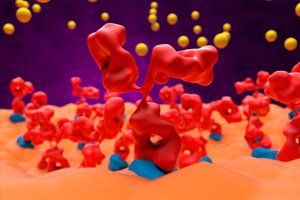
All iLive content is medically reviewed or fact checked to ensure as much factual accuracy as possible.
We have strict sourcing guidelines and only link to reputable media sites, academic research institutions and, whenever possible, medically peer reviewed studies. Note that the numbers in parentheses ([1], [2], etc.) are clickable links to these studies.
If you feel that any of our content is inaccurate, out-of-date, or otherwise questionable, please select it and press Ctrl + Enter.
The body's autoantibodies will help improve the effectiveness of immunotherapy for cancer
Last reviewed: 27.07.2025
 ">
">A new study has found that autoantibodies – immune proteins traditionally associated with autoimmune diseases – may have a profound impact on how cancer patients respond to immunotherapy.
The work, published in Nature, could be a breakthrough in solving one of the most puzzling problems in modern cancer science: why checkpoint inhibitors help some patients but not others – and how their effectiveness might be expanded to more people.
“Our analysis shows that certain naturally occurring autoantibodies can significantly increase the likelihood of tumor shrinkage,” said senior author Aaron Ring, MD, PhD, an associate professor at Fred Hutch Cancer Center. “We saw cases where autoantibodies increased the likelihood of response to checkpoint inhibitors by five to 10 times.”
The study suggests that autoantibodies could help identify cancer's weak spots and point to new targets for treatment.
Autoantibodies are proteins produced by the immune system that recognize the body’s own tissues. They are generally known for their harmful role in the development of autoimmune diseases such as lupus or rheumatoid arthritis. However, evidence is accumulating that in some cases, autoantibodies may have unexpected beneficial effects on health.
“For many years, autoantibodies were thought to be solely harmful agents in autoimmune diseases, but we are discovering that they can also act as powerful, built-in therapeutics,” said Ring, who leads the Immunotherapy Lab and holds the Anderson Family Professorship. “My lab is focused on mapping this hidden pharmacology to turn these natural molecules into new drugs for cancer and other diseases.”
In the study, Ring and his colleagues used a high-throughput test he developed, REAP (Rapid Extracellular Antigen Profiling), to screen for more than 6,000 types of autoantibodies in blood samples from 374 cancer patients treated with checkpoint inhibitors and 131 healthy people.
Checkpoint inhibitors have revolutionized the treatment of many cancers, including melanoma and non-small cell lung cancer, by enabling the immune system to recognize and attack the tumor. However, not all patients respond to these therapies, and in many cases the anti-tumor effect is incomplete and does not lead to a cure.
REAP analyses revealed that cancer patients had significantly higher levels of autoantibodies than healthy people.
Importantly, certain autoantibodies were strongly associated with more favourable clinical outcomes, suggesting their possible role in enhancing the effectiveness of immunotherapy.
For example, autoantibodies that block the immune signal interferon have been linked to better antitumor effects of checkpoint inhibitors. This is consistent with other studies that have shown that excess interferon can deplete the immune system and reduce the effectiveness of immunotherapy.
“In some patients, their immune system was literally producing its own ‘co-drug,’” Ring explained. “Their autoantibodies were neutralizing interferon, which was enhancing the effect of the checkpoint inhibitors. This gives us a clear blueprint for combination therapy that intentionally modulates the interferon pathway for all other patients.”
Not all autoantibodies were helpful, however. The team found several that were associated with worse treatment outcomes, likely because they disrupted key immune pathways needed for anti-tumor response. Finding ways to eliminate or neutralize these harmful autoantibodies could offer another promising avenue for improving the effectiveness of immunotherapy.
“This is just the beginning,” Ring said. “We are now expanding the search to other cancers and treatments to use or bypass autoantibodies so that immunotherapy can help many more patients.”
